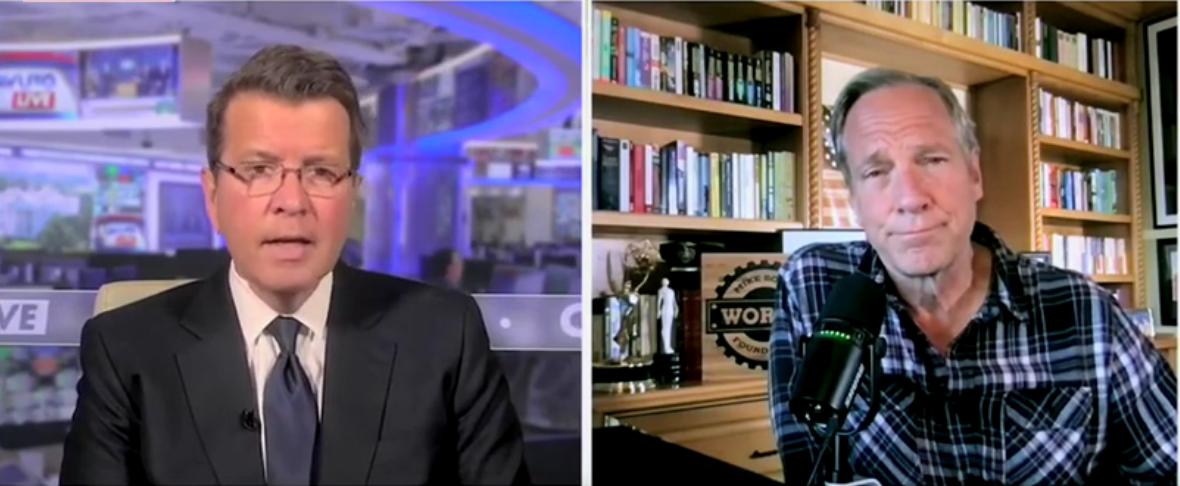Video News Clips: In Their Own Words
‘Not Having Any Of It’: Mike Rowe Touts Rising Number Of Gen Zers Generation Ditching College For Blue Collar Jobs

“Dirty Jobs” host Mike Rowe on Saturday celebrated a recent report that showed more members of Generation Z are attending vocational schools as tuition at some private colleges surpasses $90,000 a year.
Rowe joined “Cavuto Live” to discuss how the combination of rising post-secondary educational costs coupled with shortages in skilled labor are creating opportunities for young Americans to stake out lucrative careers. Yearly costs at several high-ranking private colleges recently exceeded $90,000 a year and more members of Generation Z are opting to attend vocational schools, according to The Wall Street Journal.
“Nothing in the history of Western Civilization has ever become more expensive more quickly than a four-year degree, not food, not health, not energy, not real estate, nothing,” Rowe said. Rowe pointed out that, even as millions of positions that don’t require a college degree have opened up, “we have still been telling a generation of kids the best path for most people is the most expensive path,” and ignoring trade schooling.
The number of students enrolled at vocational community colleges rose 16% in 2023, according to the WSJ. Similarly, the number of students training to become construction workers increased by 23%.
“The data is in and Gen Z is not having any of it,” Rowe said. This trend “poses a lot of inconvenient truths for people in our education system and many of our elected officials, but the evidence is now undeniable, it demands a verdict,” he continued.
WATCH:
“Every year for the past 15 years for every five tradesmen who retire, two replace them,” Rowe said. “You don’t have to be a genius to just add that up and realize the exponential weight of that just gets heavier and heavier.”
The median plumber made $60,090 as of May 2022, according the Bureau of Labor Statistics. People working in the construction industry had a median annual income of $49,330 as of 2022 and electricians had a median income of $60,240 a year.
He went on to argue that the shortage of labor in the trades provides young people with the opportunity to take on lucrative jobs in those industries by attending vocational schools.
Rowe held up Switzerland, South Korea and Germany as examples of countries that prepare young people for careers in the trades. While Rowe is critical of college degrees, they do generally improve the financial trajectory of people who hold them.
The median bachelor’s degree holder made $61,600 a year in 2021, according to the National Center for Education Statistics. Some degrees pay better, with computer engineering graduates taking home a median income of $80,000 a year, according to CNBC News.
Over the course of a lifetime, individuals with a bachelor’s degree earn $2.8 million more than people who don’t hold a degree, according to the Georgetown University Center on Education and the Workforce. The average student loan debt for an undergraduate degree, meanwhile, was $29,400 for students graduating in 2022, CNN reported.
Americans collectively hold about $1.7 trillion in student loan debt, according to the Federal Reserve. Many colleges with expensive sticker prices provide financial aid to students to mitigate their high costs of attendance.
Working in the trades, however, can carry costs to one’s physical health. Welders are at a greater risk of respiratory diseases, including lung cancer, working in construction can increase the risk of developing COPD or hearing loss and working as a plumber can cause the development of several different kinds of cancer.
“Over here, the stigmas, and the stereotypes and the myths and misperceptions that keep kids from exploring these trades and the number of guidance counselors, Neil, who are affirmatively bonused on their ability to get kids on to the college track and not the vocational track, people say, ‘Mike, how could college get so expensive?'” Rowe said.
“The answer is, how could it not?”
All content created by the Daily Caller News Foundation, an independent and nonpartisan newswire service, is available without charge to any legitimate news publisher that can provide a large audience. All republished articles must include our logo, our reporter’s byline and their DCNF affiliation. For any questions about our guidelines or partnering with us, please contact [email protected].

